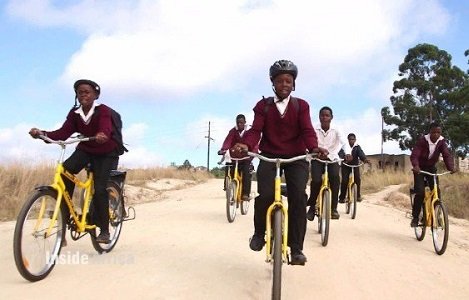(CNN) — Limpopo, in the heart of South Africa, is resource-scarce and poverty is severe. Many households do not have access to running water or electricity. For most, walking is the only mode of transport. Yet professional cycling team Dimension Data for Qhubeka finds its motivation in this disadvantaged corner of the world, and is using professional sport to better people’s lives.
Bright young things
Takings its name from its principal sponsor (Dimension Data) and the Nguni word for “progress,” this South African team has exploded on the cycling scene after starting out as a small, third domestic division crew.
The team’s young riders (all are under 23) spend eight months of the year training in Tuscany, Italy in the hope of making it to the world team.
“Last year when we thought about creating the team, we went out to find the best riders in Africa,” says Hein Badenhorst, coach of the continental team. “There’s an abundance of talent in Africa that doesn’t have the opportunity to come here and race.”
The South African team has risen from a small domestic third division crew through to the world stage, but has never forgotten its rural Limpopo connection, taking its name from its principal sponsor and Qhubeka, an Nguni word meaning ‘progress’ or ‘perform’.
One of the brightest hopes for African cycling is Eritrean Merhawi Kudus, 22.
“From year to year I’m getting more motivated and more confident. Sometimes I am close to the world class riders. I dream and I have opportunities in the future,” he says.
Cycling ambassadors
The team has made some incredible gains. Last year, rider Daniel Teklehaimanot from Eritrea becoming the first African to claim the title “King of the Mountain” in France last year, and with it the prestigious polka dot jersey.
Cycling has traditionally been out of reach for many of South Africa’s schoolchildren. Of the 16 million children in South Africa, 12 million walk to school, and in rural areas more than two million walk at least an hour to school each way. It’s a significant reason behind why only 55% of children who enroll in grade one pass their twelfth grade.
To address this issue, the team launched a bicycle education empowerment program.
Since starting the project two years ago, Qhubeka has donated 65,000 bicycles to fifty schools across the country — and it’s having results.
“It has been about two and a half years and we are already seeing a marked increase in school attendance,” says Anthony Fitzenhry, founder of Qhubeka, who notes there’s been a 20-30% increase in pass rate among participants.
“A bike is a means to an end,” says Dimension Data team principal Doug Ryder, “and a means to an opportunity.”
It’s an approach the team hopes will nurture a new generation of potential competitors.
“If we want to succeed in our African dream, we need more people across the African continent to ride bicycles,” says Ryder. “If you look through Africa, nobody rides a bike, because there’s a perception that if you ride a bike, you’re too poor to own a car.”
“We thought if we could create a hero on a bicycle, then we could change the perception and we could make it cool to have a bike,” he adds.
“Africa has developed the best endurance runners, [so] why not cyclists?”
